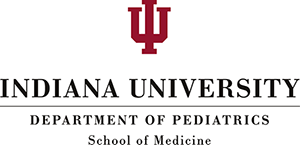Riley Child Development Center LEND Collaborates with Interpreters to Promote Family and Clinical Outcomes (IN LEND)
August 5, 2015

|
Due to the increasing number of children and families that present to the Riley Child Development Center with limited English proficiency, a workgroup was developed in order to assess how we could better meet the needs of these families. As there are limited resources across the state that provide services in diverse languages, we believed that developing a closer partnership with the on-staff interpreters in the hospital was the second best way to optimize our interactions with and meet the needs of these families. While conducting standardized testing in a language other than English is less than ideal and breaks the standardizations process, this is our best avenue for better understanding a child's development in order to make appropriate referrals and connect families with resources in their communities.
From this workgroup, we developed a presentation to collaborate with the interpreters in the hospital. The goal of this partnership was to promote family and clinical outcomes. The presentation focused on providing an overview of our department, including the LEND program, the types of services we provide to children and families, and the wide range of interdisciplinary team members that participate in these visits. The focus was to educate the interpreters about the complex nature of attempting to obtain background information, current levels of functioning, and conducting standardized testing procedures. In addition, the presentation created dialogue about the role of the interpreters when multiple family members were present. Over the course of two sessions, all on-staff interpreters have now attended the presentation. By providing this information and opening the dialogue with the interpreters, we, as clinicians, are better able to meet the needs of our families and make the most of the clinical experience of these families given the less than optimal event of conducting testing in a language other than English. In addition, our working relationship with the interpreters enables us to be more culturally sensitize and to receive direct input from them regarding how best to present information and diagnoses.







